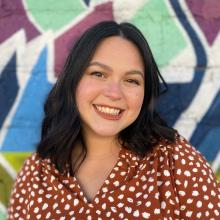Member Spotlight: Andrea Wiglesworth
Graduate Student, University of Minnesota Twin Cities
Why did you decide to choose Developmental Science as a course of study or career?
As an undergraduate student, I did not have a very clear idea of what I would want to do in graduate school. It was not until my time spent at UNC Chapel Hill in Dr. Mitch Prinstein's lab that I really came into my own as a scientist. It was at that time that I realized my passion for suicide research. I always knew that suicide was a critical issue in Indian Country, but it was not until working with Dr. Prinstein that I realized the ways I could leverage Developmental Science toward Native suicide prevention. Upon having this revelation, I became very invested in understanding biological processes across development and the role of stress in disrupting typical developmental processes. I saw pursuing Developmental Science as necessary in developing sufficient knowledge in neurobiological and physiological stress processes and suicide risk in young people, which I could begin to translate to Native peoples either in or after graduate school.
Who inspired you and why (and/or who inspired you to go into your chosen field of study)?
I am constantly inspired by my family. My mother, Kim Guyett, instilled the importance of education and the importance of family in me very early on. She has always inspired me to pursue the things that seem difficult or just out of reach. My family has also endured a lot of hardship and loss, particularly over the past 10 or so years. Yet, there has never been a dearth of humor, love, or selflessness. This has made me think a lot about how we talk about (or don't talk about) resilience in psychology, particularly when thinking about Native families and communities, and how I can bring these lived experiences into my work.
Do you have a mentor or mentors who have been instrumental to your career and, if so, who and how?
I have had several mentors who have been incredibly instrumental in my development, whether or not they have realized the role they have played for me. Dr. Mitch Prinstein was an invaluable resource for me in the time in between my undergraduate and graduate training. I entered the Peer Relations lab as a very enthusiastic trainee who had a long way to go before being ready for graduate school. He provided scaffolded training in research methods and was an incredibly supportive human being. My imposter syndrome may have had a better chance of hindering my success if it were not for his consistent support. My current PhD advisor, Dr. Bonnie Klimes-Dougan, has also been instrumental in my success as a graduate student. Dr. Klimes-Dougan has been a steadfast supporter of me and my work. She is always there to challenge me to push myself outside my comfort zone and to think more critically about research. I came to graduate school being unsure whether I would be able to focus on Indigenous suicide research, and Dr. Klimes-Dougan has gone above and beyond to support me in pursuing this work as well as provide training in the other areas critical to my development as a clinical scientist. Finally, I must acknowledge the mentorship that Dr. Joseph Gone has provided to me. Dr. Gone has been integral to my development as an Indigenous thinker and writer. While his mentorship has influenced concrete achievements (e.g., in publishing and fellowship applications), the impact is much larger. Dr. Gone has a really special way of providing challenging feedback that ultimately inspires self-confidence and growth. He is an incredibly thoughtful psychologist who takes great care in when and how he communicates ideas, a trait which I aspire to as a trainee.
What advice would you give to a Grad student beginning their Ph.D. studies in Developmental Science or related?
My advice would be to trust your gut and regularly engage in activities that energize you. Our thoughts and emotions are really important pieces of data. As we navigate through all of the different parts of graduate school (e.g., teaching, research, possibly clinical work, mentorship, etc.), it is so important to notice and honor how we feel wearing these different hats. This circles back to the second point which is, if you notice that one of these hats provides you with energy rather than takes energy, make note of that. It can be really effective to try to spread those energy-giving activities throughout the week so that you can stay connected to why you are pursuing this degree. This also includes non-PhD activities that might be energy or meaning giving (e.g., talking with family, physical activity).
What publication or book would you say is a must read in the field (and why)?
It is tough to pick a single reading, but I would probably take a step back to think about social science more broadly and recommend "Decolonizing Methodologies: Research and Indigenous Peoples" by Dr. Linda Tuhiwai Smith. Reading this book really encourages thoughtful reflection on how we approach and conduct research, what knowledge systems we privilege, and so on. I think all trainees and established scientists can benefit from critiquing the systems they are training and working within, particularly with an eye toward Indigenizing knowledge curation.
